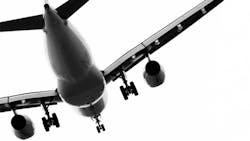Electric Planes to Debut for Airline Serving Nantucket, Vineyard
Electric-plane company Eviation Aircraft Ltd., which just signed up its first customer, predicts that in a few years it may not be able to keep up with orders.
“We’ll have a supply issue, not a demand issue,” Chief Executive Officer Omer Bar-Yohay said in an interview at the Paris Air Show. The founder of the Israeli venture capital-backed developer said U.S. regional airline Cape Air has agreed to buy a “double-digit” number of planes. The carrier flies some 88 Cessna turbo-props on routes such as Boston to Martha’s Vineyard and New York to Nantucket.
Eviation was showcasing a prototype, transported in pieces to the biennial exhibition, and is “talking to everyone” about future sales, said Bar-Yohay. Prospective customers include major U.S. carriers like United Continental Holdings Inc. and JetBlue Airways Corp., which are interested in planes to feed hubs, he said.
Eviation’s plane, the Alice, is one of a host of electric models at the design stage, and its nine-passenger capacity and 650-mile range from a single charge could give it an edge in the commuter market, currently served by a variety of light aircraft. Interest in electric planes is growing as the aviation industry comes under criticism for increasing emissions of greenhouse gases.
Eviation is planning a first flight later this year in the U.S., followed by the assembly of more planes in Arizona and Washington state and certification around 2021.
“We’re a bit ahead of the pack but I have no doubt others are coming,” Bar-Yohay said, adding that taking on a customer like Cape Air will also entail developing charging and maintenance infrastructure.
“The hurdles aren’t just about getting the plane out the door, but everything else that goes with them,” he said. “We need an environment to support the plane and trained engineers and mechanics.”
Aircraft Economics
Eviation contends its plane makes economic sense: Running costs for the Alice will be about $200 per flight hour versus $1,000 for a turboprop. The Alice will be slower than some conventional craft, with a cruising speed of 240 knots (276 miles per hour), half the pace of modern business jets but not far short of some turboprop models.
The company is targeting “middle mile” commutes like Paris to Toulouse, Oslo to Trondheim in Norway and San Jose to San Diego.
Based in Kadima, near Tel Aviv, Eviation was founded in 2015 by a team of aviation and technology specialists. It’s one of about 100 different electric-aircraft programs in development worldwide, up 30% since 2017, according to Roland Berger, a consulting firm.
Zunum Aero, backed by Boeing Co. and JetBlue, aims to bring a hybrid-electric commuter model to market by 2022, while MagniX Technologies Pty is developing a propulsion system for an all-electric plane with a similar date in mind. In September, it announced a successful ground test of a 350-horsepower motor attached to the nose section of a Cessna test rig.
Joby Aviation Inc. is aiming smaller, targeting the air-taxi market with a plane that would carry four passengers, travel 150 miles and fly at a few thousand feet. Unlike the Alice, it wouldn’t be pressurized. Uber Technologies Inc. has said it’s also working on a flying taxi as an extension of its ride-sharing product that would take off and land vertically and reach the market by 2023.
At the other end of the scale, Easyjet Plc has partnered with U.S.-based Wright Electric to develop a full-sized battery-powered airliner within a decade for flights of less than two hours, enough to link London with Paris or Amsterdam.
Siemens AG, Airbus SE and Rolls-Royce Holdings Plc are working on a hybrid-electric propulsion system, the E-Fan X, that would also power a relatively large aircraft. Roland Berger predicts that the first 50-seat hybrid airliner will enter fare-paying service by 2032.
About the Author
Bloomberg
Licensed content from Bloomberg, copyright 2016.
